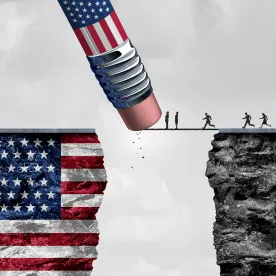Pending further appeals, the Court’s decisions grant the federal government’s request to enforce President Trump’s September 24 executive order that limits entry into the United States by nationals from eight countries.
The US Supreme Court issued two brief orders on December 4 that granted the government’s request to stay two prior injunctions issued by the US District Courts for the Districts of Hawaii and Maryland. The president’s most recent proclamation (“the Proclamation”) of September 24 may now go into full effect while the courts of appeals consider the arguments before them. The decisions note that the Supreme Court “expect[s] that the Court of Appeals will render its decision with appropriate dispatch.” The US Court of Appeals for the Ninth Circuit is scheduled to hear oral argument on Wednesday, December 13, and arguments before the US Court of Appeals for the Fourth Circuit will follow on Friday.
We summarized the effects of the Proclamation in a prior post and describe them again in full below.
Country-Specific Restrictions
The country-specific visa and entry restrictions imposed by the Proclamation are the following:
-
Chad/Libya/Yemen—Entry into the United States by nationals of these three countries seeking initial admission as immigrants[1] or as nonimmigrants on business (B-1), tourist (B-2), or business/tourist (B-1/B-2) visas is suspended.
-
Iran—Entry into the United States by nationals of Iran seeking initial admission as immigrants or nonimmigrants is suspended, except that entry by nationals of Iran under valid student (F and M) and exchange visitor (J) visas is not suspended (although such individuals will be subject to enhanced screening and vetting requirements).
-
North Korea/Syria—Entry into the United States by nationals of North Korea and Syria seeking initial admission as immigrants or nonimmigrants is suspended.
-
Somalia—Entry into the United States by nationals of Somalia seeking initial admission as immigrants is suspended, and nonimmigrants traveling to the United States will be subject to enhanced screening and vetting requirements “to determine if applicants are connected to terrorist organizations or otherwise pose a threat to the national security or public safety of the United States.”
-
Venezuela—Entry into the United States by certain Venezuelan government officials and their immediate family members seeking admission as nonimmigrants on business (B-1), tourist (B-2), or business/tourist (B-1/B-2) visas is suspended.[2]
Exceptions
The Proclamation notes that, subject to certain exceptions shown below, the suspensions of and limitations on entry shall apply only to foreign nationals of the designated countries who (1) are outside of the United States on the applicable effective date, (2) do not have a valid visa on the applicable effective date, and (3) do not qualify for a visa or other valid travel document. The US Department of Homeland Security (DHS) previously confirmed following the September 24 order that the Proclamation is expressly limited to individuals who do not have a valid visa on the effective date of the Proclamation.
Notwithstanding the travel limitations described above, the suspension of entry under the Proclamation will not apply to the following:
-
US permanent residents
-
Foreign nationals admitted to or paroled into the United States on or after the effective date of the Proclamation
-
Foreign nationals who have a document other than a visa (such as an advance parole document) valid on the effective date of the Proclamation or issued on any date thereafter that permits travel to the United States
-
Dual nationals of a designated country, as long as the individual travels on a passport issued by a non-designated country
-
Foreign nationals traveling on a diplomatic or diplomatic-type visa, North Atlantic Treaty Organization visa, C-2 visa for travel to the United Nations, or G-1, G-2, G-3, or G-4 visa
-
Foreign nationals who have been granted asylum, refugees who have already been admitted to the United States, or individuals who have been granted withholding of removal, advance parole, or protection under the United Nations Convention Against Torture
The Proclamation describes the restrictions imposed upon nationals of the eight affected countries as “conditional” and states that they may be lifted depending upon future cooperation with the US government’s efforts to impose enhanced security practices—such as adopting electronic passports, sharing criminal data, reporting lost/stolen passports, and providing data on known and suspected terrorists.
As we described in our prior alerts, applicants not otherwise subject to the Proclamation may still face additional scrutiny and delay during their visa application processes. Effective May 25, 2017, consular offices implemented the administration’s “extreme vetting” efforts through a three-page supplemental questionnaire that requests, among other information, passport numbers, employment history, and travel history—including the source of funding—over the past 15 years. Affected applicants can also expect to be asked to hand over their phones and other electronic devices, including contact lists and photographs, for close examination.
[1] The prohibition on the entry of “immigrants” applies only to persons holding immigrant visas and seeking to enter the United States with such visas for the first time. It does not apply, as discussed below, to persons holding permanent resident cards.
[2] Those affected are officials of Venezuelan agencies involved in screening and vetting procedures, including the Ministry of the Popular Power for Interior, Justice and Peace; the Administrative Service of Identification, Migration and Immigration; the Scientific, Penal and Criminal Investigation Service Corps; the Bolivarian National Intelligence Service; and the Ministry of the Popular Power for Foreign Relations, as well as their immediate family members.





 />i
/>i

